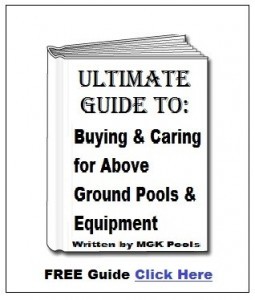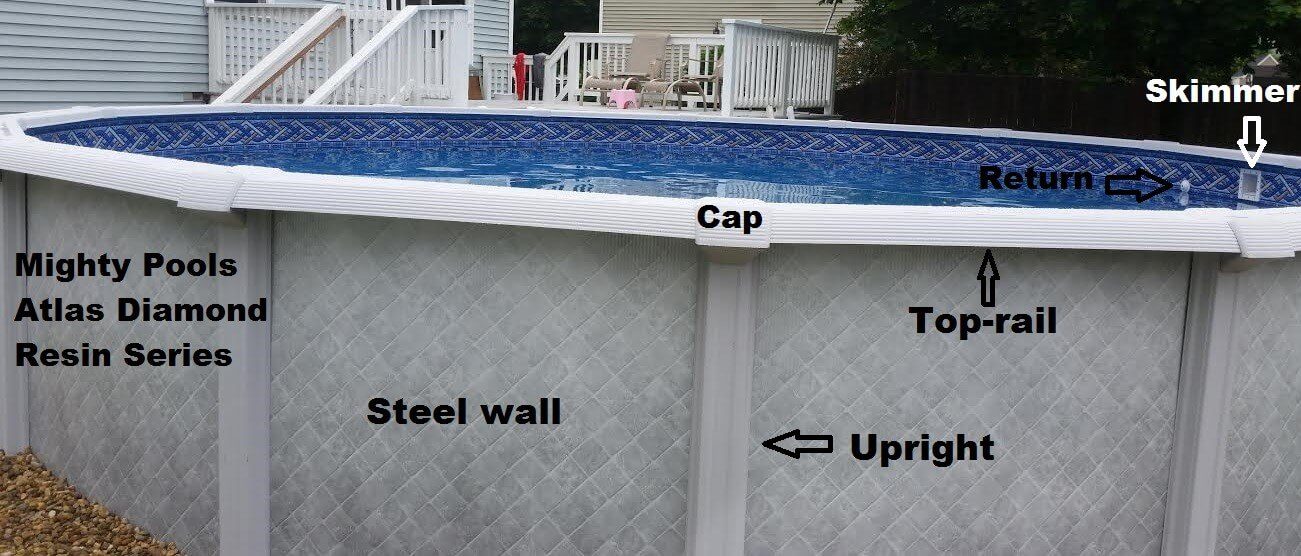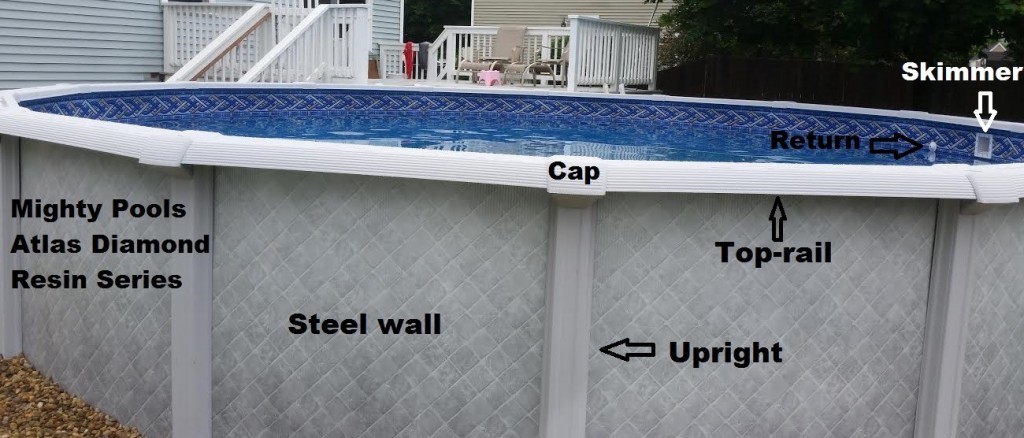Anatomy Of An Above-Ground Swimming Pool
Above-ground swimming pools include a wall, track the wall sits in (top & bottom), connector plates (they connect the tracks), uprights (vertical columns), top-rails (self-explanatory), caps (cover where the top-rails come together), and hardware (screws). That’s it!
The thing that makes one pool better than another is the quality or thickness of these items, specifically the wall, and the materials used to develop these components.
I prefer an all aluminum above ground pools versus any other. A close second would be a complete resin pool, with an aluminum wall. People get hung up on steel being stronger than aluminum. Iron (steel) is the last thing you want on an above ground pool.
I have worked on pools for over 30 years, and I am working closely with a manufacturer to brand my line of pools. My manufacturer is the maker of Buster Crabbe and Aquasport pools. They make all my “MGK Pools” (formally Mighty Pools) models for me. They know the pool manufacturing industry as good as anyone and better than most.
In an attempt to bring the best swimming pools to market, I have worked closely with Buster Crabbe, and have learned what goes into the manufacturing process, where materials come from, what’s best, etc. I have put together this article, to quickly and easily bring you up to speed.
Above-Ground Pool Walls
No matter what swimming pool you buy, all above ground pool walls are made of Steel or Aluminum. “Resin Pools” do not have Resin walls, Resin pools have either a Steel or Aluminum wall. I wrote an article reviewing above ground pools; Strength, and durability of the pool wall was the primary factor that went into rankings.
There is no dodging the fact, Steel will rot, and Aluminum will oxidize. As long as there is oxygen on the planet, these are the facts. So your pool wall is going to deteriorate eventually. What you need to know is, how to pick a pool wall that doesn’t do it as quickly. Aluminum oxidizes much much slower than steel rots out. If you get a thick aluminum wall, the pool will outlast you!
Aluminum pools cost a little more, elite aluminum pools a lot more, but you get 2-3 times the life of these when compared to steel pools. Also, fewer headaches and regret. And even the elite pools only cost a couple thousand more. Over 35 – 40 years what’s that work out to, 50 bucks a year?
There are three critical factors:
- The thickness of the metal
- Quality of the metal
- Coating and painting that is used to seal the metal
Above-Ground Pool Wall Thickness
A thicker wall is stronger and more substantial. Steel and Aluminum cost depends on weight; more weight equals more value, so larger pools will naturally weight more, and cost more, so will smaller pools with better more massive walls. Your job is to get as much weight as you can for your money.
Quality Of The Metal
You want a pool wall made of US Steel and or Aluminum. China ships thousands of pools every year, made of cheap recycled steel. Pool companies over here, like big box stores (*cough Namco), and pop up pool companies, slap a name on them and sell them to people who don’t know any better.
Coating On Above-Ground Pool Walls
Even the best metal will oxidize and rot out if it is left untreated. There is a lot of marketing talk when it comes to these coatings and paint jobs. Pool manufacturers trademark names to use for these treatments so that they can differentiate themselves from their competition. Attempt to increase margins.
All Steel walls should be hot dip galvanized coated, and then painted. The thicker the coating and paint, the better. If you should ever chip the surface paint, be sure to seal it with an enamel based paint. Lawnmowers are famous for kicking rocks at the pool wall and scratching the protection (most important for steel walls).
Pro Tip* Make sure the two holes in your pool wall; The hole for the pool skimmer and the other hole for the return of filtered water get treated with enamel paint, or that a butterfly gasket is used to keep the pool water off the untreated metal. The needed holes are cut after the wall has been treated and painted, exposing the inner core of the wall. Salty and or chlorinated water will quickly begin the oxidation process (rotting) of untreated steel. Because these areas have no paint is why you often see rust by these openings in the pool wall.
Aluminum Pool Walls
Nobody sells a thicker aluminum wall than Buster Crabbe / Aquasport Pools. It’s just a fact; I couldn’t say it if it weren’t true. Since I use their walls for my pools too, nobody sells a thicker Aluminum wall than us. Pay more if you want, but you won’t get a better pool.
Pool walls from Radiant Pools Manufacturer look two inches thick, but it is just two thin sheets of aluminum cladding Styrofoam. When did you see anything besides a beer cooler use Styrofoam as a construction element?
If you couldn’t tell, I am a huge fan of aluminum walls for obvious reasons (no rust = value). But never decorate an aluminum pool with limestone, or build a pool in an area rich in limestone. This stone is very aggressive towards aluminum. People love to landscape around their swimming pools with white limestone rocks. You should also limit exposure to stone dust (sometimes used as a foundation).
Above-Ground Pool Wall Construction
There are two types of an above ground pool wall. One comes on a roll and is rolled out on the job, with hardware to mechanically fastened the two ends. The other typically called slat-wall uses interconnecting extruded aluminum panels (slat wall).
Pools made of extruded aluminum panels are best. That’s why on my pool reviews page I claim the Aquasport 52 the best above ground pool on the planet. No other pool has a thicker extruded slat-wall pool panel.
Conclusion On Pool Walls
It might not surprise you to find out, that many pool manufacturers buy their pool walls from the same suppliers right here in the US. Think about that for a second. While some of these guys use cheaper coatings and paints, Like G60 instead of the better G90. Or some manufacturers buy a lighter less expensive iron. They are all buying the same product and selling it at different prices. The money grabber class are marketing garbage at a premium price!
Even their quality pool walls are just as thick and treated the same as mine. The only difference being the pattern printed on the wall, and the price you are charged. Well, that, and all the marketing talk. People are paying thousands more for the same weight of steel, treated the same way.
However, I only use the best pool walls, no matter the pool model I’m selling; they use cheaper and cheaper materials for their less expensive models — enough sales pitch from me.
You may want to pay a little more if you like the overall look of a pool. That makes sense; there is no accounting for taste. But why spend thousands more for something that is not better?
Resin Above-Ground Pools
Resin or composite resin is just another way of saying plastic. The good thing about plastic is it doesn’t rot or oxidize. Many old Steel pools get replaced because the top-rails or caps rot out. Someone chipped the paint with a service pole or something while doing some cleaning, and before you knew it, a perfectly fine pool had top-rails rotted out, and pool had to be torn down.
If I am not going to buy an all aluminum pool, then I prefer resin top-rails and uprights with an aluminum wall. Aluminum and resin are why you see more extended warranties than you used too.
Aluminum Above-Ground Pools
These pools are typically made of all aluminum but may have a few, or many resin components. While these swimming pools don’t rust, they do oxidize. The thicker the aluminum, the longer it will take for oxidation to cause a hole. Tiny pinholes form due to acidic materials like limestone rocks. Avoid these with aluminum pools if possible.
Aluminum pools carry a slightly higher price tag. Materials cost more, and also they last longer than steel.
Steel Above-Ground Pools
Steel pools are made entirely of you guessed it, Steel. The Wall, Top-rails, Uprights, Track, Connector plates, Hardware, Etc. Steel pools are the most popular (also cheapest). While Steel will rust, it can last a long time if it is thick, adequately maintained and installed.
All steel wall pools, except for the one exception mentioned below, come on a roll and are mechanically fastened with a bar and hardware. Steel pools are the cheapest and offer the worst warranty, as they are prone to rotting.
Wilkes makes the most robust steel pool, also known as Gibraltar on the East coast. The Wilkes/Gibraltar is the only “steel panel” pool I know of ever made. This pool cost roughly $15,000.00 more than the steel pools you see anywhere else.
Cost Of The Three Above-Ground Pool Types
Steel is usually the cheapest of all above ground pools. Resin pools are in the middle of the price range, with aluminum often the most expensive. Steel is more common as you would expect with the lower materials cost. There is nothing wrong with steel pools as an option if your only looking to get 10-20 years from it, the problem is many are so cheap you are lucky to get 2-5 years.
Salt Above-Ground Pools
There is no such thing as salt above-ground pools. The seller is just including a chlorine generator, commonly referred to as a salt system. You can install a salt system on any above-ground pool. Some pool sellers disregard manufactures who warn that the use of a salt system will void the warranty. Some manufacturers condone it, and charge more for the pool, as though there is a metal that is not corroded by salt.
Salt is not an alternative to chlorine, it is a chlorine generator. For a real chlorine alternative and water that feels and looks amazing, check out the new Oxygen Pools System.
What Going On?
Corrosion proof metal does not exist. However, what sellers of “salt pools” are banking on is that the pool will last for two years. The wall of your 35 or 50-year warranty becomes prorated after just two years. Yes, two years. So they will gladly send you a new wall because you paid for it when you paid extra for the “salt pool.” But after two years you are responsible for around 50% of the cost of that wall, all the teardown and rebuilding expense, the water, and of course a new pool liner because you cannot get an old liner to work in a new pool.
They will likely charge for shipping that 150-300-pound wall to you. All this is the same cost as having a new pool installed, and you still need to pay for water. And guess what. It all starts again in 3-5 years. So please oh please, don’t buy a salt system for your above-ground pool.
Don’t just take my word for it, check out the science. If your old enough to remember the original Toyota’s, made of cheap Asian Steel??? The cars ran forever, but the bodies rotted right out from under you everywhere the roads were salted.
Conclusion
Slat wall pools are best, aluminum is the best material and when paired with resin can get the best value. Salt systems create chlorine and rot your pool metals. If you go salt go aluminum, and warranties are pretty useless after two years so buy a good pool.

